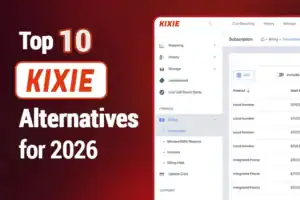The call center can be a wonderful place to work in, full of positivity and great people. Don’t believe me?
We live in a world where adequate management is hard to come by. Efficient management is even rarer. And in the contact center world specifically, things get even messier.
And it’s not because people don’t try, don’t like their jobs, or don’t care about their work. It’s because of many different factors from turnover, agent quality, who you promote, who you demote or fire, and how you go about doing all of these.
We’ve interviewed some of the brightest, most experienced minds in the call center on how to manage a call center efficiently. We’ve also done the research and combined it with the insights we’ve gathered from our guests, plus many years of expertise. And here are the results! Let’s dig in.
I. People
Before you get the hang of managing people, you need to make sure you have the right people for the job. Employees that should never work in a call center end up here and that’s typically between it’s one of the first stepping stones for many people when they start looking for work.
1. Stop Hiring Based Solely on Experience
Some of the best colleagues I ever had were people who had none to very little prior experience on the job. That’s because they’re often the ones most open to learning and bettering themselves.
That’s no different in a call center. For entry-level positions, and even for middle ones, going for someone with less experience can be beneficial, provided that person knows or can learn what they need to do.
So many organizations and call centers, they get a resume and they say wow, this is a really good rep, they worked at two other contact centers, they’ve worked in the industry for 25 years. It’s a long time, but that might not fit what we’re looking to do. They may not fit the type of program, the type of client, the type of organization that we are. So that’s a huge piece of it.
Of course, an experienced candidate should not be dismissed, but there are other more important things such as being excited for the work they’re about to do, being approachable and personable, and, last but definitely not least, being high in emotional intelligence.
2. Rate People Based on Emotional Intelligence
Now, I took a bit of advice from our podcast episode with Jim Rembach (link further down at number 9), but emotional intelligence should play an integral part in your hiring process if you’re serious about managing a call center efficiently.
Especially in a contact center, emotional intelligence plays an integral role in management. You need people that can handle tricky social situations, stressful conversations that may take a toll on their mental health.
If an employee cannot handle the typical stressors, then it’s better for both parties to not move further from the interview. You can find advice online on how to determine a candidate’s emotional intelligence during an interview.
3. Fire the Ones that Need Firing
This person’s been here for how long? Really? Well, that’s why it’s not working.
People that don’t integrate within the environment, people that don’t respect company culture and core values, people that aren’t necessarily 100% competent. These people need to go sooner rather than later.
The more you keep bad matches around, the worse you’ll come out of the experience as a company. Time typically allows for anyone within a company to have a chance at a promotion. Given enough time and carelessness, slightly bad apples can rot your company to the core.
2020 is the year of big changes, and it’s also the year where you need to make sure you’re not losing money and time on people that should’ve been fired a long time ago.
4. Find Adaptable People Who Can Handle Work from Home
We’ve done the whole transition to work from home. It’s not pleasant for anyone but the good part is the outlook is brighter than ever – if you’re prepared, that is.
You need to find and onboard people that not only can work from home but can do so efficiently and without requiring extra work from other members of your company.
It’s a lot more than just a physical presence and if you find the right people, they figure out how to be supportive even when they’re not physically close together. We had Facebook pages, group text pop up. [You need to] find a way for people to be who they are at their core, even if the medium changes completely.
It’s all about attitude and it ties in with what I said about emotional intelligence earlier. Sam says it best here – you need people that can be who they are wherever they are.
5. Hire People Who Know What They’re Doing
Last but, honestly, one of the most important practices for effective call center management is to hire competent people (and always hire up). It may seem straightforward, but a lot of times interviewers can be lulled by some candidate’s way with words, and completely forget to make sure that candidate can do their job.
Thankfully, tests are the standard practice these days. However, you also need to ensure there’s no cheating during the test – so watch out!
II. Management
Now you have the people – cool! What do you do with them? You can’t simply set them free upon a mass of inbound and/or outbound calls and see what happens. Efficient management techniques are essential for a call center to run smoothly and increase productivity
6. You Have to Show Up as Management
The manager’s job starts with showing up! One of the best pieces of advice we could ever give on how call centers can be run efficiently comes from Steve, our CEO here at NobelBiz.
Back in late 2019, on our very first podcast episode, he went into how he likes to show up for his people. And I couldn’t agree more. But let’s hear it from him:
Management has to show up. Not be on a pedestal but show up and integrate into the environment you’re at. So, if you can get the same culture everywhere you have staff and if that culture can be based upon your core value and everybody can own that, you’re making a big step.
We’ve always had remote people here at NobelBiz. We pride ourselves on being a global company. So, integrating culture into the entire remote workforce has been one of the keys to our success. Whether it’s through monthly calls, articles, weekly Yoga sessions over Zoom, it doesn’t really matter. What matters is that it’s happening.
Here are some advises :
- Provide support for agents and avoid Micromanagement at all costs
- Address unfair treatment among your employees
- Clarify roles, hierarchy, and improve communication
- Provide regular training sessions for Supervisors
7. Don’t Promote People Who Can’t Handle It
Not everyone is cut out to be a manager and that’s okay! People can have the technical skills of a genius and the people skills of a walnut. You can’t expect everyone who’s a good agent to be equally adept at managing a team of agents.
Just because you’re good at sales, doesn’t mean you’re good at running a sales team. Just because you’re good at one thing, doesn’t mean you’re going to be good at teaching it. Not every player becomes the coach.
You can train people to be good managers, or you can hire good managers to oversee teams of experts. The balance should be somewhere in between and it should come naturally.
8. Incentivize Attendance and Success
Taking another good call center management tip from our guest Thomas Laird (liked at no. 1 on this list), you need to make sure people show up. In a call center, particularly in a stressful call center, it’s difficult to motivate everyone to come to work.
Not every call is easy, the pay is sometimes not good enough, couple that with the stress of such a job and you might be having big issues with employee turnover.
A great way to get over this is to make their success more attractive – whatever the call center metrics associated with it. You cannot expect everyone in the company to care as much about it as the CEO. So, as a call center manager, you need to find other ways to make people care – whether it’s bonuses based on KPIs, attendance bonuses, streak bonuses, or others.
9. Continuously Train Your Employees
Training in a call center needs to be second nature. Not only is it invaluable during the onboarding process, but it’s also essential to maintain all your employees on the leading edge and your clients happy.
If you don’t have a culture and an environment that is focused on continuous learning, you have a lot of errors. Your whole quality program is dealing nothing but with errors. And then if you’re only focusing in on errors, you start having an exception processing problem because people start complaining. And it’s just a downward spiral. So, you have to continually focus in on developing the skills of your people.
Constantly fixing problems is not a good way to make it big as a business. It’s one of the easiest ways to run it into the ground.
10. Innovate with Advanced Training Simulations
You can’t expect the traditional training model in a call center to work forever. In fact, it’s barely been functional for as long as call centers have been a thing. Nancy Munro, voice interactions expert and guest on our podcast, says it best: role-playing training just doesn’t work because employees have to sit there and be awkward in front of their managers. Here’s why simulation training is best for managing a call center the right way:
You get somebody on the phone for the first time and they’re trying to talk to you, number 1 very few people actually answer their phone anymore so when you actually get a live person on the phone you’re like “oh crap! They answered the phone – now what do I say?”
Sometimes we trust a bot better than we trust our manager. They’re unbiased, they’re gonna just judge me on my performance.
The advantage of simulation training is that it brings a comfortable environment and that deer-in-the-headlights moment in front of new, inexperienced agents. And the result is a much better training experience.
11. Make Work Fun with Gamification
Call centers aren’t fun environments, usually. Tensions run high, the pressure of the queue can be exhausting and with no type of distraction there to help you through it, it can be rough for both agents and managers.
A cool way to destress and manage a call center efficiently is to promote gamification.
Make it a competition. Bring in fun games for people to play during breaks. Promote long breaks for team-building activities for those working from home. Even setting a mandatory coffee break can make a big difference, especially for those who can’t work in the office.
12. Ensure Proper Scheduling and Reporting
Now onto the literal job of a good manager – managing schedules, reports, and making sure everyone is working as efficiently as possible while not being overworked.
This one goes together with one of the points on operations – buying the necessary tools for people to do their jobs.
Once you have the right tools, make using them compulsory, and provide training for anyone that needs it. Literal efficiency is probably one of the most often and surprisingly overlooked elements in call center optimization 101.
13. Be Ready for Big Changes at Any Point
Change management? Didn’t think we’d be talking about it but here goes. Any effective business needs to have adequate change plans in place. Change management ensures that any change – whether on an internal or external level – is done practically and with as little effort as possible.
I talk about having FIVE THINGS when it comes to change management: vision – you have to tell them why, incentives – tell people why it’s gonna benefit them, resources – give them what they need to get through it, skills – train them if they need training, and an action plan – let them know what’s gonna happen, when it’s gonna happen! And don’t forget the why – that’s the most important thing, right?
– Roy Atkinson on Change Management –
By following these five things Roy talks about and having a plan set up, you’re guaranteeing business continuity in the long run.
Last Updated on February 27, 2025

Andrei is an experienced marketing professional specializing in propelling growth for both B2B and B2C companies. Proficient in streamlining marketing operations and enhancing lead and customer experiences through SEO and marketing techniques.





